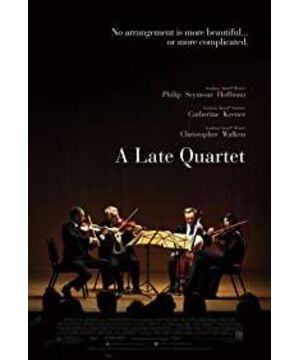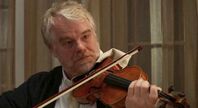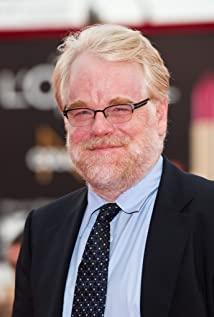If you have attainments in classical music, you may have a deeper understanding of this film. If you have understood or played Beethoven - String Quartet No. 14 in C-sharp minor, Op.131, then what you get from this film There must be more insight. But if the movie were to be positioned in this way, the audience would be very small. Although "The Late Quartet" uses Op131 as the theme throughout the play, even if you don't know anything about the music, it will not affect the appeal of the movie itself. It is very valuable to have an interest in the beautiful classical music that runs through it through watching movies. Among the movies related to classical music, the last one I saw was "Copying Beethoven". When the Ninth Symphony was played, I was moved to tears. Since then, my impression of classical music has changed from ignorance to a little understanding. Although I can't deepen my understanding because I don't have the basic quality in music, I can at least begin to appreciate this most wonderful and beautiful part of human history. If there are shortcomings in life that can be made up, then the understanding of music and art will become the most needed part of this life. Apart from language, only music and pictures can express emotions and thoughts, and the levels reflected by these two And depth, often makes language feel barren and pale.
But life will never be perfect. No matter what kind of life, there are bound to be flaws. The person you like is missed, and the unfulfilled dream is difficult to realize. Even the harmonious "Fugue" band in the film has finally started after 25 years of harmonious resonance. The sound of cracks erupted. The illness of the quartet's mentor, the cello, is just the introduction, the trigger for a series of disintegrations. But in the final analysis, this kind of conflict and shock that erupted is actually a 25-year-old regret and dissatisfaction that was not shown in the film. As audiences, we don't know how the characters in the film spent these 25 years. The only words we know are the love and resentment 25 years ago, and the gunpowder and mess 25 years later. I keep thinking, is it only in the film that these stories can be brought forward for such a long time of 25 years, in real life, will this combination disappear long ago? But maybe 25 years is not as far away as we imagined, or it may have passed in a blink of an eye, and the death of the cellist's wife a year ago may have already laid the groundwork for the future. We cannot assume what will happen in life, since we know so little about it.
The perfect 25 years that did not appear in the movie, like all the happy times in life, we were immersed in it at the time, but it seems that there is no trace after that, only the undercurrents that we ignored when we were immersed in happiness surged up, and When the precious happiness was swallowed up, I suddenly woke up from the dream of happiness and went to clean up the mess. But in times of misery, confusion, and pain, memory often becomes lucid, and every detail may be vividly remembered. The film tells the story of only a few days, but the experience of everyone in the story may be longer than the past two decades. Happiness makes us obsessed and dull, suffering makes us mature and alert, the two are as inseparable as two sides of life.
Going back to the story, it seems that the plot is full of blood, but it is more like real life. The relationship between the protagonists in the quartet is inextricably linked. A and his wife raised B and treat B as their own. B fell in love with A's proud student C, but ended in failure, and turned to be with D, who was not as talented as C. In this way, A, B, C, and Ding were in harmony with each other. ) for 25 years. Until A's wife died and he also suffered from an irreversible disease, B inadvertently hurt C's fragile self-esteem for more than 20 years. The latter turned to the dancer he met while running, and C was tutoring Unstoppably in love with the daughters of Yi and Ding... In the blink of an eye, the harmonious coexistence of more than 20 years seems to be a complete illusion, and these bloody stories seem to be possible for everyone. If there is also a story in Op131, I wonder if it is also a trivial and real life like this?
No matter what state we're in, life doesn't stop because of it, fugue bands may disband or go on, but the instruments are still there, the audience is still there, problems are never solved by running away, everyone has to go face life. After all, a perfect life is an illusion that never exists, but if we are willing to face it and solve it, life can still become as beautiful as the story, can't it?
There are plenty of puns about life and music in the play, and it's a perfect fit for a film about music. The actors are of a very high standard in both acting and music (in a layman's view), and the depth and vividness of a film that may be dull and uninteresting (relying heavily on dialogue and music presentation) is remarkable. Finally, there is a little story about Op131 in the movie. It is said that Schubert's last wish before his death was to hear Beethoven's Op131 work, and when he died, many musicians performed this music for several days in front of his tomb. Ye, for that alone, should listen to this string quartet.
View more about A Late Quartet reviews











